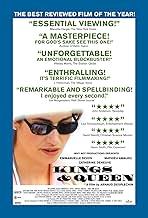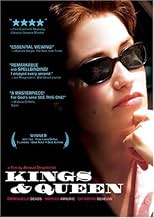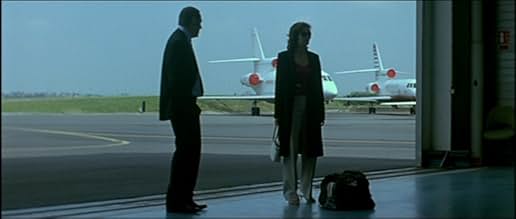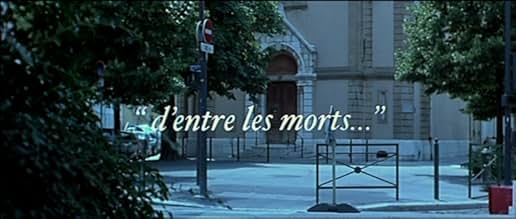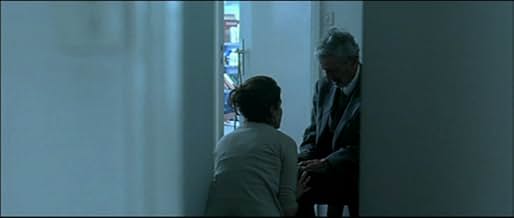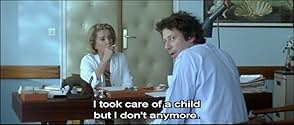Füge eine Handlung in deiner Sprache hinzuParallel storylines tell the current state of affairs for two ex-lovers: Nora's a single mother who comes to care for her terminally ill father; holed in up in mental ward, Ismael, a brillia... Alles lesenParallel storylines tell the current state of affairs for two ex-lovers: Nora's a single mother who comes to care for her terminally ill father; holed in up in mental ward, Ismael, a brilliant musician, plots his escape.Parallel storylines tell the current state of affairs for two ex-lovers: Nora's a single mother who comes to care for her terminally ill father; holed in up in mental ward, Ismael, a brilliant musician, plots his escape.
- Regie
- Drehbuch
- Hauptbesetzung
- Auszeichnungen
- 9 Gewinne & 18 Nominierungen insgesamt
Empfohlene Bewertungen
Use of two parallel, initially apparently unrelated story lines is a favourite structure for movie makers. One that immediately comes to mind is Le Huitieme Jour. In Rois et Reine, one thread is Nora, a beautiful art gallery director struggling with a terminally ill father and a fatherless son Elias. The other thread is Ismael, a viola player taken into a psychiatric ward through strange circumstances. However, it does not take long (relative to the two-and-a-half-hour film) to get to the convergence point where the audience are privy to the fact that Nora and Ismael had lived together for seven years during which Nora's son developed a devoting affection for and attachment to Ismael (which, incidentally, reminds me of a similar relationship in Love Actually, in a character played by Liam Neeson).
But this is only the bare beginning. The sprawling story surrounding these two main characters commands the viewers' every attention, and this film really deserves several viewing.
I wouldn't attempt to go into all the details of the many characters, sub-plots and sub-texts. Briefly, the central story is Nora's relationships with three men, Elias's father who was shot under suspicious circumstances, Ismael who became Elias's de facto father and the man she is now going to marry but is not really certain if she truly loves or not. While those relationships are touched on lightly, some through flashbacks, her relationship with her father Louis and sister Chloe receive sharper focus, with twists and turns leading to some rather devastating revelations towards the end.
With Ismael's family (and there are quite a few members) the circumstances are very different, but equally intriguing. While there is also conflict, and this one centres around the issue of adoption and estate, the mood in one of wry humour. Family matters aside, there is also another dimension, the psychiatric ward, where Ismael interacts with no less than three psychiatrists (one played by Catherine Deneuve) as well as a women fellow-patient Arielle with whom he develops a close relationship that continues after their discharge.
And don't be mislead into thinking that quantity will compromise quality. The entire film is throbbing with energy, telling the story in so many different ways, in so many changing moods, which, however, never feels disjointed. Similarly, the deft use of background music brings you delight in every turn.
I have only touched on the bare surface of this absorbing film. Among the many fascinating aspects of the film is the development of the two main characters and a common characteristic: both are vain and arrogant. Yet, the interesting thing is that they are not portrayed in that light at all. It's through the description by other characters that this comes to light, and then we are compelled to look behind the surface to understand.
The audience will find that there are many scenes, from devastatingly emotional to hilariously noire, that they will remember long afterwards. If I were to pick a most memorable one, however, it will be the last scene, between Ismael and Elias, and I think many who have seen the film will agree. A masterful piece of auteurist work, Rois et Reine is a film that will be a crime to miss.
There's a lot of play with psychoanalysis (highlighted by Catherine Denueve in a bit part as a psychiatrist) that is fun and illuminating to watch. There's speckles of romance, dark humor, nihilism, magic realism, and soap opera theatrics with lots of references to philosophy, mythology, and poetry that keep the film interesting and unpredictable even as its over two and a half hour run time tries your patience. There are plenty of revelations and big emotional payoffs here punctuated well with eclectic music choices (everything from classical pieces to some sort of catchy European hip-hop) and nice little surprises (Magalie Woch is delightful as the lovely suicidal mental patient who becomes smitten with Ismael). This utterly French film gives the viewer a lot to chew on, even if you have to gnaw through a bit of gristle before dining on the filet mignon.
At any rate, this is a complex film that seems to have a lot of influences, mainly mythological and even it has shades of Shakespeare's King Lear. At two hours and forty minutes in length, the film could have used some badly needed trimming. It appears M. Desplechin don't know when to cut some of the things one sees in different sequences that could have been helped with the principle that "less is more".
One thing the director can't be blamed for is the wonderful performances he gets from all his actors, especially, the luminous Emmanuelle Devos, who does an amazing work portraying Nora, the woman at the center of the story. Also good, Mathieu Amalric, who is Ismael, the man that connects a lot of different points to the story. Maurice Garrel, as Nora's dying father is compelling. Valentin Legong as little Elias is also a great asset.
Let's hope M. Desplechin new venture will be a bit tighter in his future work.
Our first impressions of each parallel character who seems to have no relation with any other character undergo a complete turn-around by the time we have finished circling around them in time and space at the end of the film, especially as we begin to realize they are unreliable, self-serving narrators of their own experiences.
Each person is part of a very modern blended family, both by genetics and selection, and faces the most quotidian of life cycle decisions -- life, birth, marriage, paying bills, parent/child responsibilities, Laingian sanity and particularly death -- and makes a different choice how to handle them, whether active or passive, peremptorily or as fate.
But each choice leads them to the next unexpected plateau of choices with guilt hanging on each move. For each, doing the right thing means something completely different as each responds differently to an emotional and physical crisis.
Though psychoanalysis is drolly mocked as just another philosophy, each character may be eccentric or seriously crazy and undergoes Freudian traumatizations by family in casually cruel ways that alternate between funny and shocking (and sometimes absurd).
Director/co-writer Arnaud Desplechin revels in the diversity of his characters, so that as their orbits collide they can hardly communicate because their frames of reference are so different.
The acting brilliantly matches the unexpected revelations that flash back to let us know how each character got to be this person and the transformations to where they are going. Emmanuelle Devos as "Nora" lusciously fills the screen even as we find that her nonchalant beauty masks the devastation she leaves in her wake as it helps her use others for her selfish needs.
Desplechin has frequently cited Woody Allen as an influence (and "Seinfeld"), and Mathieu Amalric's Ismaël is a tribute to that talkative, intellectual Jewish persona and Philip Roth is mentioned as well, though this character is much more up on hip pop music and surprisingly matures as he gains far more humanity than his New York inspirations.
The film is long and slow, but curiosity about how each character got to where the film started is involving.
It's impossible to keep up with all the erudite references to poetry (Desplechin says the title comes from a chess metaphor in a French poem: "King without kingdom/ Queen without a scene/ Castle broken/ Bishop betrayed/ Fool as a brave man"), literature, mythology, art, music and film ("Moon River" seems to be used frequently these days).
Eric Gautier's cinematography is sensual and is particularly dreamy when an awful event occurs.
The production design creates illustrative environments for each person and family, as every object around each character has ironic counterpoint to the dialog.
The soundtrack eclectically extends from electronica to klezmer to hip hop to singer/songwriters Paul Weller and Randy Newman to classical and more that reflect the characters' psychological mise en scenes.
Wusstest du schon
- WissenswertesThe title of the movie was inspired to Arnaud Desplechin by the five first lines of a poem by Michel Leiris: "Rois sans arrois Reine sans arène Tour trouée Fou à lier Cavalier seul"
- Zitate
Nora Cotterelle: There are four men I loved. I killed two of them.
- VerbindungenReferenced in Liebe ist Nervensache (2005)
- SoundtracksPavane pour une Infante défunte
Composed by Maurice Ravel
Top-Auswahl
- How long is Kings & Queen?Powered by Alexa
Details
- Erscheinungsdatum
- Herkunftsland
- Offizielle Standorte
- Sprachen
- Auch bekannt als
- Kings & Queen
- Drehorte
- Produktionsfirmen
- Weitere beteiligte Unternehmen bei IMDbPro anzeigen
Box Office
- Budget
- 3.871.153 € (geschätzt)
- Bruttoertrag in den USA und Kanada
- 290.973 $
- Eröffnungswochenende in den USA und in Kanada
- 16.101 $
- 15. Mai 2005
- Weltweiter Bruttoertrag
- 3.839.556 $
- Laufzeit2 Stunden 30 Minuten
- Farbe
- Sound-Mix
- Seitenverhältnis
- 2.35 : 1
Zu dieser Seite beitragen


